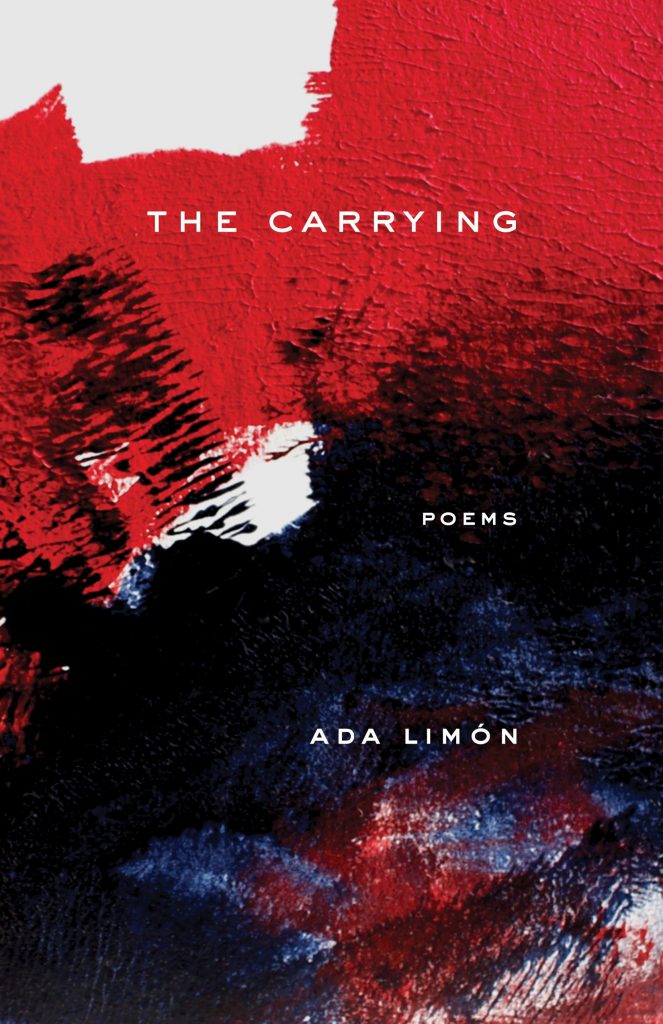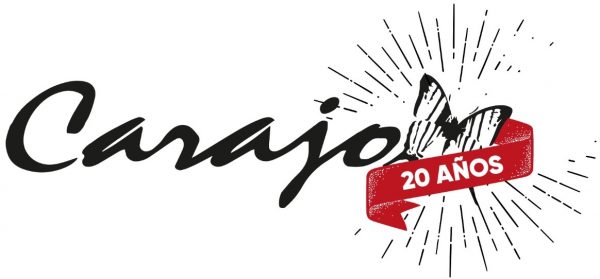
del libro The Carrying
The Year of the Goldfinches
There were two that hung and hovered
by the mud puddle and the musk thistle.
Flitting from one splintered fence post
to another, bathing in the rainwater’s glint
like it was a mirror to some other universe
where things were more acceptable, easier
than the place I lived. I’d watch for them:
the bright peacocking male, the low-watt
female on each morning walk, days spent
digging for some sort of elusive answer
to the question my curving figure made.
Later, I learned that they were a symbol
of resurrection. Of course they were,
my two yellow-winged twins feasting
on thorns and liking it.
El año de los jilgueros
Eran dos los que se quedaron y rondaban
el charco de lodo y el cardo almizclero.
Revoloteaban de un poste astillado de la cerca
a otro, se bañaban en el destello del agua de lluvia
como si fuese un espejo a un otro universo
donde las cosas fuesen más admisibles, más sencillas
que donde vivía. Yo velaba por ellos:
el macho brillante pavoneándose, la hembra
de bajo voltaje en cada paseo matutino, pasaban los días
escarbando algún tipo de respuesta esquiva
a la pregunta que formulaba mi curva figura.
Más tarde, me enteré de que eran un símbolo
de la resurrección. Claro que lo eran,
mis alados gemelos amarillos se deleitaban
con las espinas disfrutando.
The Burying Beetle
I like to imagine even the plants
want attention, so I weed for four
hours straight, assuring the tomatoes
feel July’s hot breath on the neck,
the Japanese maple can stretch,
the sweet potatoes, spider plants,
the asiatic lilies can flourish in this
place we’ve dared to say we “own.”
Each nicked spindle of morning glory
or kudzu or purslane or yellow rocket
(barbarea vulgaris for Christ’s sake),
and I find myself missing everyone I know.
I don’t know why. First come the piles
of nutsedge and creeper and then an
ache that fills the skin like the Cercospora
blight that’s killing the blue skyrocket juniper
slowly from the inside out. Sure, I know
what it is to be lonely, but today’s special
is a physical need to be touched by someone
decent, a pulsing palm to the back. My man
is in South Africa still, and people just keep
dying even when I try to pretend like they’re
not. The crown vetch and the curly dock
are almost eliminated as I survey the neatness
of my work. I don’t feel I deserve this time,
or the small plot of earth I get to mold into
some place livable. I lost God awhile ago.
And I don’t want to pray, but I can picture
the plants deepening right now into the soil,
wanting to live, so I lie down among them,
in my ripped pink tank top, filthy and covered
in sweat, among red burying beetles and dirt
that’s been turned and turned like a problem
in the mind.
El escarabajo enterrador
Me gusta imaginar que hasta las plantas
quieren atención, así que arranco malezas por cuatro
horas seguidas, asegurándome que los tomates
sientan el aliento caluroso de julio en el cuello,
que el arce japonés se pueda estirar,
que las batatas, las cintas,
los lirios asiáticos puedan florecer en este
lugar que nos atrevimos a llamar “nuestro”.
Cada huso mellado de gloria de la mañana,
o kudzu o verdolaga o barbarea
(barbarea vulgaris por amor a Cristo),
y me da por extrañar a todos mis conocidos.
No sé por qué. Primero vienen los montones
de juncia y enredadera y luego un
dolor que rellena la piel como la plaga de Cercospora
que está matando despacio al azulado enebro cohete
de adentro hacia afuera. Obvio, yo sé
lo que es sentirse sola, pero hoy es especial
es una necesidad física de ser tocada por alguien
gentil, una mano pulsante por la espalda. Mi chico
todavía está en Suráfrica, y la gente sigue
muriendo aunque trato de pretender que no.
He removido casi todas las coronillas rosas
y las acederas al sondear la pulcritud
de mi trabajo. No siento merecer este tiempo,
o esta parcela que moldeo en un
lugar habitable. Perdí a Dios hace tiempo.
Y no quiero rezar, pero puedo imaginar
las plantas haciéndose más profundas ahora mismo,
queriendo vivir, así que me acuesto entre ellas,
con mi camiseta rosa sin mangas, rota, inmunda y cubierta
de sudor, entre los rojos escarabajos enterradores y la tierra
a la que se ha dado vuelta y vuelta como a un problema
en la cabeza.
Carrying
The sky’s white with November’s teeth,
and the air is ash and woodsmoke.
A flush of color from the dying tree,
a cargo train speeding through, and there,
that’s me, standing in the wintering
grass watching the dog suffer the cold
leaves. I’m not large from this distance,
just a fence post, a hedge of holly.
Wider still, beyond the rumble of overpass,
mares look for what’s left of green
in the pasture, a few weanlings kick
out, and theirs is the same sky, white
like a calm flag of surrender pulled taut.
A few farms over, there’s our mare,
her belly barrel-round with foal, or idea
of foal. It’s Kentucky, late fall, and any
mare worth her salt is carrying the next
potential Stake’s winner. Ours, her coat
thicker with the season’s muck, leans against
the black fence and this image is heavy
within me. How my own body, empty,
clean of secrets, knows how to carry her,
knows we were all meant for something.
Llevando consigo
El cielo es blanco con dientes de noviembre,
y el aire ceniza y humo de leña.
Una escalera de color del árbol moribundo,
un tren de carga pasando velozmente, y ahí,
esa soy yo, de pie en la grama invernal
mirando a la perra sufrir por el frío de
las hojas. No me veo grande desde aquí,
apenas un poste de la cerca, un seto de acebo.
Anchas aún, más allá de donde resuena el elevado,
las yeguas buscan lo que queda de la verdura
en el pasto, unos potrillos recién destetados
patean, y suyo es el mismo cielo, blanco
como una bandera de rendición mansa y tensada.
Unas granjas más allá, está nuestra yegua,
su vientre redondo como tonel lleva dentro un potro,
o la idea de un potro. Es Kentucky, fin del otoño, y cualquier
yegua que se precie está preñada del siguiente
ganador potencial del Clásico. La nuestra, su pelaje
más grueso por el fango de estación, se apoya
en la cerca negra y esta imagen me pesa.
De qué manera mi propio cuerpo, vacío,
limpio de secretos, sabe cómo llevarla consigo,
sabe que todos fuimos hechos para algo.
What I Want to Remember
Right before General Vallejo’s home,
with its stately stone and yellow walls
there’s a field along the foot path
where spring rains bring the frogs,
a whole symphony of them, breaking
open the hours just after the sun
sinks into the Pacific Ocean only
an hour away. Why am I placing
you here? I’m on a plane going west
and all the humans are so loud
it hurts the blood. But once I sat
next to a path that was still warm
from the day’s heat, cross-legged
with my friend named Echo who taught
me how to amplify the strange sound
the frogs made by cupping my ears.
I need to hold this close within me,
when today’s news is full of dead children,
their faces opening their mouths for air
that will not come. Once I was a child too
and my friend and I sat for maybe an hour,
eyes adjusting to the night sky, cupping
and un-cupping our ears to hear
the song the tenderest animals made.
Lo que quiero recordar
Justo antes de la casa del General Vallejo,
con su piedra majestuosa y muros amarillos
hay un terreno a lo largo de la vereda
a donde la lluvia primaveral trae ranas,
toda una sinfonía de ellas, liberando
las horas justo antes de que el sol
se hunda en el océano pacífico en tan sólo
una hora. ¿Por qué te estoy colocando
allí? Estoy en un avión que va hacia el oeste
y todos los humanos son tan ruidosos que
le hace daño a la sangre. Pero una vez me senté,
al lado de un camino aún tibio
por calor del día, cruzada de piernas,
con mi amigo Echo quien me enseñó cómo
amplificar el extraño sonido de las ranas,
ahuecando las manos a la altura de mis orejas.
Necesito contener esto cerca dentro de mí,
pues las noticias de hoy están llenas de niños muertos,
sus rostros abriendo sus bocas para tomar un aire
que nunca habrá de llegar. Una vez fui niña también
y mi amigo y yo nos sentamos por una hora,
los ojos adaptándose al cielo nocturno, ahuecando
y desahuecando nuestras orejas para oír
la canción de los animales más tiernos.

